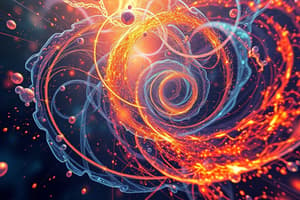Podcast
Questions and Answers
What happens to molecules during the phase change from a liquid to a gas?
What happens to molecules during the phase change from a liquid to a gas?
- Speed up, move closer together, and absorb heat energy
- Slow down, move closer together, and absorb heat energy
- Speed up, move farther apart, and absorb heat energy (correct)
- Speed up, move closer together, and release heat energy
Which phase change involves molecules moving closer together and releasing heat energy?
Which phase change involves molecules moving closer together and releasing heat energy?
- Gas to liquid
- Solid to gas
- Liquid to solid (correct)
- Solid to liquid
What is the term for the phase change from a gas to a liquid?
What is the term for the phase change from a gas to a liquid?
- Melting
- Vaporization
- Freezing
- Condensation (correct)
During the phase change of sublimation from a solid to a gas, what happens to molecules?
During the phase change of sublimation from a solid to a gas, what happens to molecules?
What is the heat movement during the phase change from solid to liquid?
What is the heat movement during the phase change from solid to liquid?
Which factor has the greatest influence on the strength of dipole-dipole forces between molecules?
Which factor has the greatest influence on the strength of dipole-dipole forces between molecules?
Why are ion-dipole forces important in understanding the behavior of electrolytes in polar solvents?
Why are ion-dipole forces important in understanding the behavior of electrolytes in polar solvents?
How do ion-dipole forces change as the charge on the ion increases?
How do ion-dipole forces change as the charge on the ion increases?
What is the primary reason that ionic compounds like sodium chloride can dissolve in polar solvents like water?
What is the primary reason that ionic compounds like sodium chloride can dissolve in polar solvents like water?
How do dipole-dipole forces compare to hydrogen bonding in terms of strength?
How do dipole-dipole forces compare to hydrogen bonding in terms of strength?
Which of the following factors would lead to the weakest dipole-dipole interactions between molecules?
Which of the following factors would lead to the weakest dipole-dipole interactions between molecules?
How do ion-dipole forces affect the viscosity of an ionic solution in a polar solvent?
How do ion-dipole forces affect the viscosity of an ionic solution in a polar solvent?
Which property of a polar solvent is most affected by the strength of ion-dipole interactions?
Which property of a polar solvent is most affected by the strength of ion-dipole interactions?
How do ion-dipole forces compare to ionic bonds in terms of strength?
How do ion-dipole forces compare to ionic bonds in terms of strength?
Which of the following would have the weakest dipole-dipole interactions?
Which of the following would have the weakest dipole-dipole interactions?
Flashcards are hidden until you start studying




